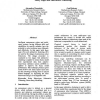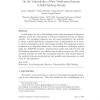592 search results - page 68 / 119 » User adaptation: good results from poor systems |
ECIS
2011
12 years 8 months ago
2011
The paper presents a persuasive web application that stimulates residential energy conservation. The users of the application received consumption feedback that is based on electr...
ENGL
2007
13 years 9 months ago
2007
— As is the trend worldwide, India is undergoing rapid urbanization. This means not only that more people than ever before will be living and working in cities, but also that mor...
EUSFLAT
2001
13 years 10 months ago
2001
Intelligent autonomous robots and multiagent systems, having different skills and capabilities for specific subtasks, have the potential to solve problems more efficiently and eff...
CN
2006
13 years 9 months ago
2006
In this article, we propose a new single-rate end-to-end multicast congestion control scheme called Explicit Rate Multicast Congestion Control (ERMCC) based on a new metric, TRAC ...
PR
2010
13 years 3 months ago
2010
In this paper, we use a hill-climbing attack algorithm based on Bayesian adaption to test the vulnerability of two face recognition systems to indirect attacks. The attacking tech...


